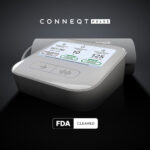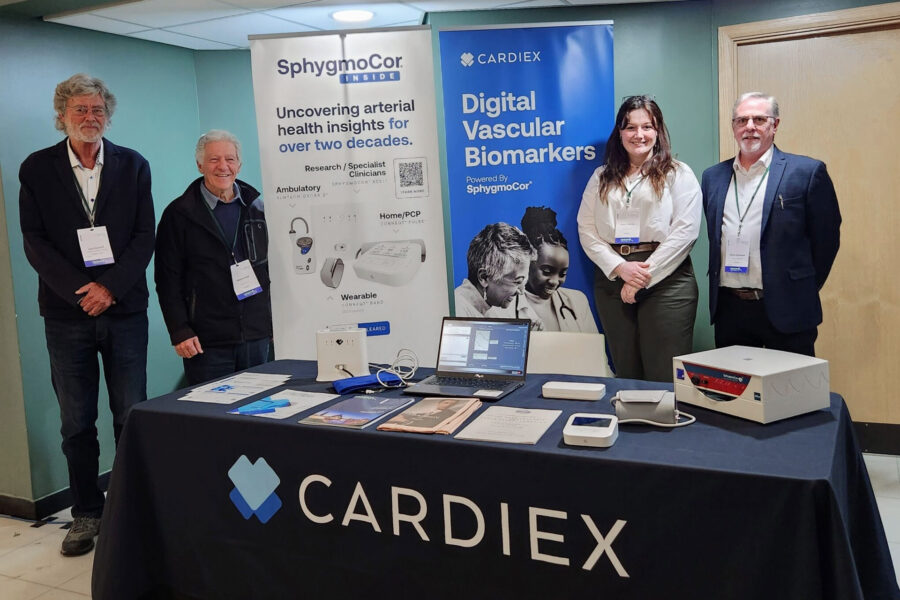
FDA Grants 510(k) Clearance for the CONNEQT Pulse, a World-First Vascular Biometric Health Monitor
April 21, 2023
CONNEQT Pulse Achieves Milestone with Inclusion on the Validated Device List
April 25, 20242024 Trends
Personalized, Accessible, Intelligent: Reshaping Vascular Health in 2024

The landscape of vascular health is undergoing a profound transformation in 2024, moving beyond siloed data and one-size-fits-all approaches. This year, intelligence, personalization, and accessibility take center stage, driven by cutting-edge trends like AI-powered risk prediction, multi-modal data integration, and non-invasive technologies. Let’s explore five innovations pushing the boundaries and offering exciting possibilities for improved patient outcomes.
1. AI-Empowered Insights and Personalized Risk Prediction
Forget generic assessments. Deep learning algorithms are now extracting hidden clues from pulse wave analysis, detecting early signs of arterial stiffening – a silent precursor of cardiovascular disease – much earlier than ever before. These insights unlock the door to personalized risk models tailored to everyone’s unique vascular fingerprint. Imagine proactively guiding patients towards better heart health and longevity based on their personal roadmap, powered by Artificial Intelligence (AI).
2. Unveiling the Full Picture: Multi-Modal Data Integration
Move beyond single-dimensional assessments. A new era dawns where a patient’s vascular health can be illuminated by weaving together a tapestry of data – pulse waves, heart rhythm, blood flow, and even arterial stiffness. This powerhouse approach isn’t confined to research labs anymore. Soon, your trusty wearable or smartphone app could become a multi-talented health detective, continuously monitoring and weaving these data points into a personalized, real-time understanding of your vascular health. This empowers proactive health management, allowing you and your healthcare providers to fine-tune lifestyle choices and make informed decisions based on your unique vascular signature.
3. Personalized Medicine Based on Vascular Biomarkers
The tide is turning in cardiovascular disease management, with personalized medicine fueled by digital vascular biomarkers. Gone are cookie-cutter treatment plans. Clinicians now wield a nuanced lens, peering through pulse wave analysis and other non-invasive tools to unveil the intricate tapestry of individual vascular health. This granular perspective unlocks many possibilities, from tailoring medication regimens to pinpointing bespoke therapeutic targets. Consider the delicate realm of maternal health, where these digital sleuths offer invaluable non-invasive assessments of preeclampsia risk, paving the way for early intervention and safeguarding both mother and child. As research blossoms and clinical applications mature, digital vascular biomarkers promise a new era of personalized, data-driven cardiovascular care, where each patient receives the proper treatment at the right time for their unique vascular fingerprint. This customized approach extends far beyond overt symptoms, empowering proactive interventions and potentially rewriting the narrative for conditions like preeclampsia.
4. PPGs and the Shift Towards Continuous Monitoring
Blood pressure is going optical. Photoplethysmography sensors are being seamlessly woven into wearables and patches, enabling continuous, real-time readings. Think about the possibilities: early detection of hypertension through subtle blood pressure fluctuations, personalized treatment plans based on comprehensive real-time BP (Blood Pressure) data, and empowered patients actively participating in their health management. This shift isn’t just a technological leap; it’s a paradigm shift towards personalized, data-driven healthcare, empowering individuals and healthcare professionals to work together for a healthier future.
5. Accessible Technologies Democratizing Vascular Health
The future of vascular health is not only personalized and intelligent but also accessible. The focus is shifting towards developing non-invasive and affordable digital tools, democratizing vascular health, and holding immense potential for early detection and prevention of cardiovascular diseases, particularly in underserved communities. Smartphone pulse wave analysis apps and cuffless tonometers empower individuals to take charge of their cardiovascular health, enabling frequent monitoring and proactive lifestyle adjustments. By bridging the gap in access to essential cardiovascular monitoring tools, we can empower individuals, healthcare professionals, and communities to work together towards a future where CVD (cardiovascular disease) prevention takes center stage.
These trends signal a paradigm shift in vascular healthcare, one where our SphygmoCor® technology and the products it powers – SphygmoCor XCEL, CONNEQT Pulse, and the soon-to-be-released CONNEQT Band – are paving the way for greater access and control of each individual’s cardiovascular health. Our solution’s ability to capture a comprehensive vascular picture through pulse wave analysis aligns perfectly with the rising tide of personalized, data-driven care. Moreover, its non-invasive nature positions it to under insights into cardiovascular health not previously accessible in care.
Join us in shepherding a future where vascular biomarkers are used to enable an early intervention and ongoing monitoring tool. Together we can extend health span and reduce the global burden of cardiovascular disease risks. If you would like to learn more about how SphygmoCor technology can support your work, let’s talk. Contact us today to schedule a meeting.



